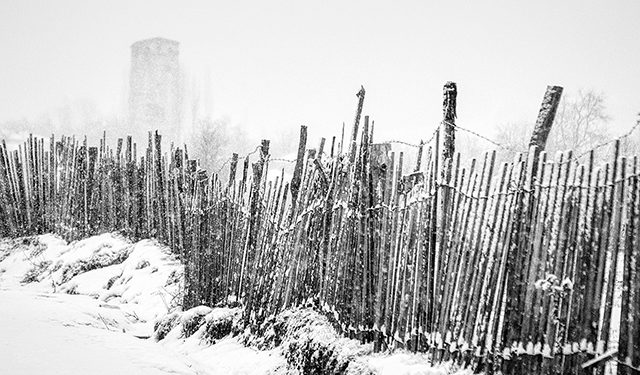I chose a title for this week’s article which links to the photo accompanying it. The Dadeshkeliani watchtower appears like a phantom in the mist as winter descends on the village of Etseri, Upper Svaneti, where my wife and I have based ourselves (with this winter off) since 2012.
I returned to Etseri following the horrific events there of the night of January 1, in which two young men were murdered by gunfire following a drink-fueled street fight. Events and details are murky owing to the darkness, confusion of people wading in to try and break it up, who shot whom when, who fell or was knocked to the ground, and so on. One of the men had a young family, the other was single. The former’s father had also been murdered some years earlier, in another conflict, at a feast in Kakheti province.
My wife and I know both victims, as well as both prime suspects, who are in police custody. One of these is the father of the latter victim (though not his supposed killer); that victim’s mother is now in a coma in hospital from her fall to the cement road outside their house, hitting her head. Prognosis as yet uncertain. The other prime suspect we had met, along with his parents, only last summer, in Nakra (the father is now dead of cancer). So, three devastated families; rage and chaos all around.
Several police cars have stayed parked and occupied between the two houses, in hopes of averting what the Svans are historically infamous for: Revenge. The police are aware of the high feelings and phoned death threats which have been made.
The funerals were held a couple of days apart, to give the villagers time to prepare the feasts. Women were hired from Samegrelo province to prepare and clean up after the usual vastly more than necessary food, bringing one complaint to my hearing of laziness among the village women. I could only think to myself, let them be spared such labor: they work much too hard anyway. The men handle the slaughter and butchery of animals, cauldrons on fires for the meat stews, and setting up plus dismantling of the benches, tables and a marquee if necessary).
The first funeral just squeaked in before winter proper descended: No snow aside from the sprinkling already present, no wind, no excessive cold, and thus no need of a marquee. The brother of the dead man bellowed out, “Where are you going!” in Svan, over and over again, at least giving vent to his agony instead of holding it in. The women screamed repeatedly as the funeral procession made its way to a lonely but beautiful grave site dug under a tree overlooking most of the village; no possibility of burying him anywhere near the other man, whose family dominates the nearest proper cemetery. These are more than the usual loud and sorrowful funeral sounds: we were still all in shock over the murder, youth and confusion. It was cool enough that we did not stay long for the feast.
The second funeral was about equally loud, with the mother and widow leading the wailing, as to be expected. About 20 cm had fallen since the first funeral, with the temperature falling to -10 or so and the wind getting up, necessitating the marquee. We started without even forks, using bread to scoop up when we could, but the forks were merely late. Nonetheless, we finished this feast quickly as well, due to the cold. Hardly anyone was in much of a mood for eating in any case.
I had decided between these two events that I will not drink alcohol anymore in Svaneti, nor make liqueurs here: It is one of our curses. Given that toasts to the dead, which are practically the only toasts at a funeral feast, allow a few drops to be poured out on the ground, I poured out every glass completely, saying that this was what the occasion required of me. The irony of imbibing so much alcohol in honor of people who have died precisely from its effects on their relationships enrages me, and is one of my battles in Svaneti. I have pledged to be more radical in opposing drinking here: Any good it does is so much less than its evil that it might as well count for nothing.
I pondered much what to say to the bereaved families, and the three “friends” of Job in the Bible were a negative example. When Job loses all his family and possessions, Satan being allowed by God to test his faith but not take his life, the three spend several days mourning with Job. Then they open their mouths… and ruin this demonstration of compassion as they proceed at length to blame him for it all, saying it must be God’s punishment for his wrongdoings. God eventually shows up and blasts them into silence and repentance with his long set of rhetorical questions about where they were when He created the universe. Job’s status is completely restored.
I had much anger in my own heart, too, but decided that loudly pointing out a general need to do an about-turn from drinking and grudges would serve nothing at this moment of extreme grief. Instead, I mourned with the mourners; tried to offer comfort, love and prayers; and merely urged those filled with fury to release whatever they had in their hearts, not to hold onto it. There is peace for now, but much remains to be done towards healing. IS there the ghost of a chance?
There were also a few hours here and there to take some photos as the drabness of snowless winter allowed itself to be transformed. Beauty restores my soul, and is never hard to find. More on that next week.
BLOG by Tony Hanmer
Related story: Murder in Svaneti
Tony Hanmer has lived in Georgia since 1999, in Svaneti since 2007, and been a weekly writer and photographer for GT since early 2011. He runs the “Svaneti Renaissance” Facebook group, now with nearly 2000 members, at www.facebook.com/groups/SvanetiRenaissance/
He and his wife also run their own guest house in Etseri: www.facebook.com/hanmer.house.svaneti














